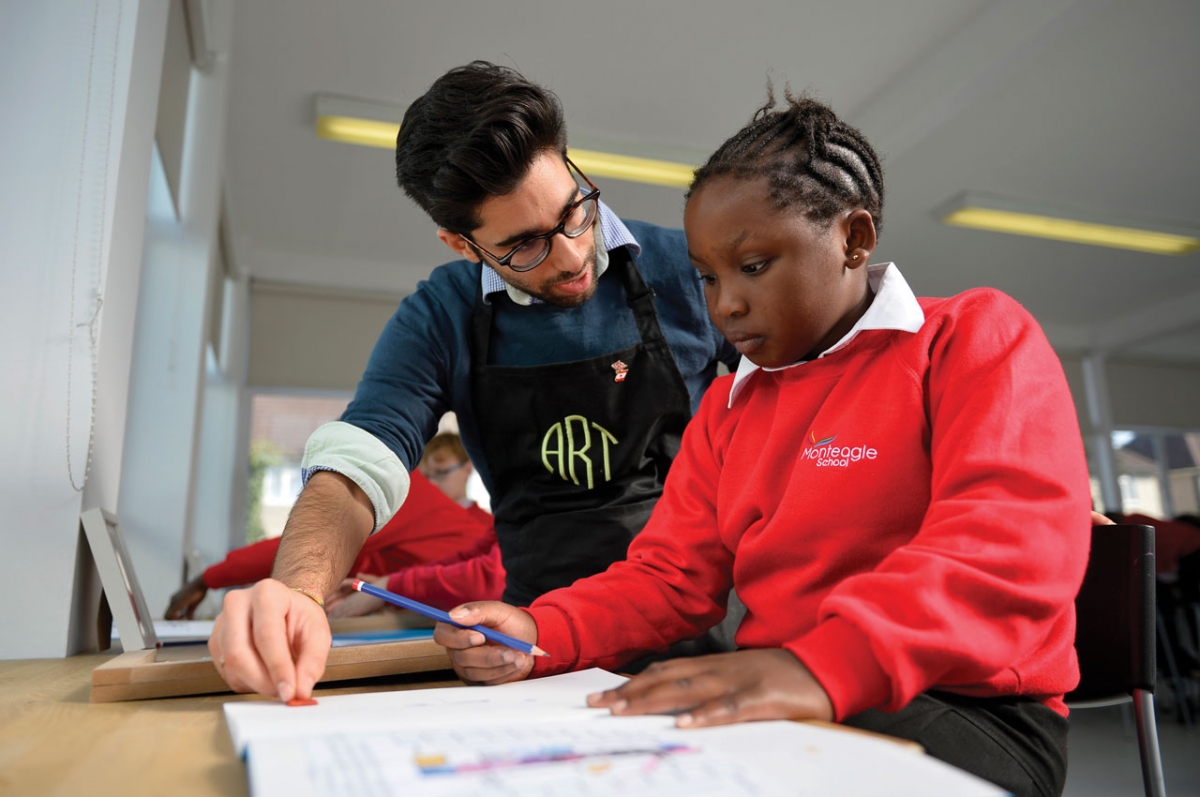
One of the most rewarding moments in teacher Alex Kais’ day is when he comes to collect children from their classroom for his art instruction.
“We get to do art!” they exclaim as he walks in the door. “If that’s not making a difference,” he says. “I don’t know what is.” Art can be a healing tool, says Kais BFA ’11, BEd ’12, who celebrates his fourth year of teaching this September. He oversees the physical education, music, art, and French departments at Monteagle Primary School, in London, England.
“On a day-to-day basis, I can see the difference that the art is making in school. This is so imperative in a time where our children—not just British—are glued to screens and not getting out to explore the world.”
Though Kais has long felt a connection to music and drama, “the visual arts always called to me.” He began taking art lessons when he was 11 and fell in love with the idea of constantly being able to create things.
“The artistic process always fascinated and appealed to me,” he says. “It reminds me of the process all artists must take: a musician for learning a piece of music, and an actor for performing and creating a character to take an audience on a journey.”
The Windsor-born Kais became convinced the University of Windsor was the right choice for him when he attended its Head Start Orientation program. “I had an amazing experience during my visit. I knew that this was the place I wanted to be.”
As a visual arts undergrad, Kais’ specialty was printmaking, though he worked on performance art, as well. He says that what he most enjoyed was the professors. Dr. Michael Farrell, William Law and Susan Blight “supported and nurtured my development and progress within the arts.”
He narrowed his career focus to education following a study year he spent overseas, courtesy of a Rotary ambassadorial scholarship. The scholarship’s purpose is to further international understanding and friendly relations among people of different countries and geographical areas.
While abroad, scholars serve as goodwill ambassadors to the host country and give presentations about their homelands to Rotary clubs and other groups.
“I went to England under the auspices of the supporting education pillar,” explains Kais. “I knew I would become a teacher one day, and I wanted to help those who were in most need of an education.”
Following his year abroad, Kais returned to Windsor to earn his bachelor of education degree—something he calls “one of the best decisions I’ve ever made.”
“The University of Windsor was well-known for its education program,” he says. “Even in England, I’d run into teachers who’d studied at Windsor.”
The grad says he was “overjoyed with the educational placements I had. My associates at the different schools were knowledgeable and helped shape the teacher that I am today.”
Kais completed a Visual Arts Internship program course, where he taught at his old high school. “The experience I gained was life-changing.” He specialized in Ontario Junior-Intermediate level of teaching but, in the UK, he is qualified to teach from Nursery up to A-level studies. Once Kais graduated, he returned to England. “The people I met here helped me to become a better person, as well as promoting my new take on the Rotarian motto of ‘service above self.’ At the end of the day, teaching is about providing a service to those who will become the future leaders of tomorrow.”
He worked for six months in a supply teaching position and then was offered a position teaching Year 3 for one year. From there, Kais moved on to Monteagle Primary school.
Kais says he particularly enjoys teaching primary school children because “You can create a bond with primary school children that you can’t do when they get to high school where you won’t see them as often.”
The area where he works is considered underprivileged. “I feel that this gives a wider application of my abilities to help these children connect through creative practices.”
Kais’ role has recently expanded to lead the team overseeing the physical education, music, art, and French departments. His is one of few schools that offer such a range of programs in those areas.
“With funding cuts looming, it is imperative that the arts and humanities continue to thrive in our primary schools so that our children get a well-rounded education.”
Kais says his job is very rewarding. “When I hear children say to me that when they grow up they want to be an artist, it means they are being inspired by all the work they are seeing around them. It is the greatest joy!”